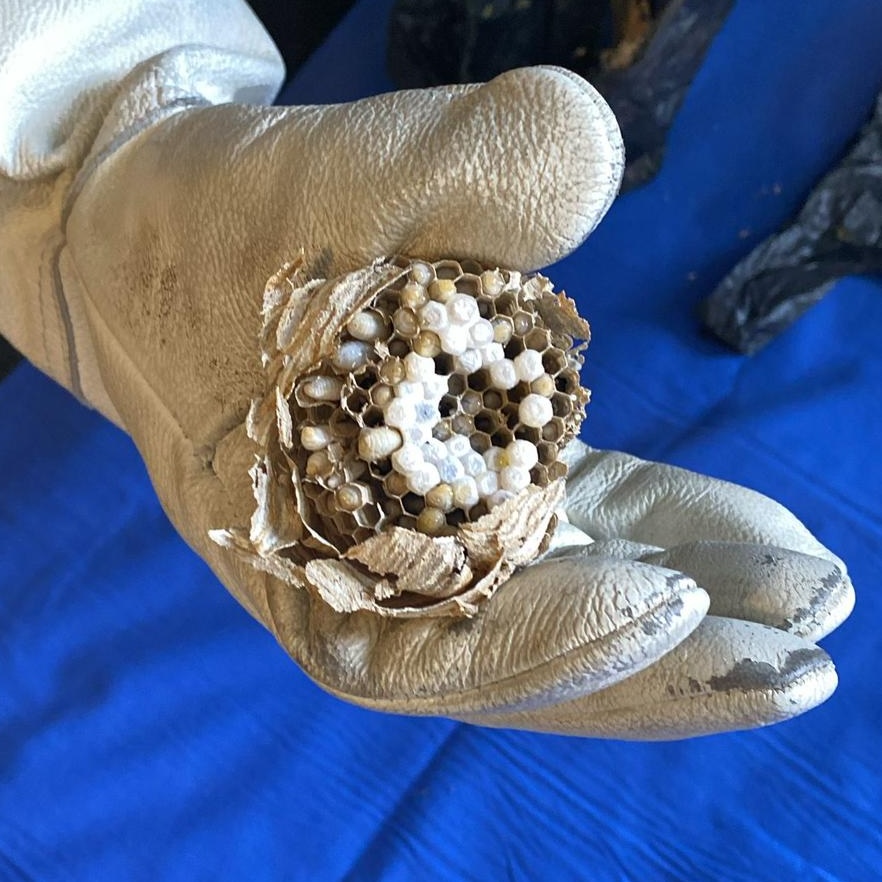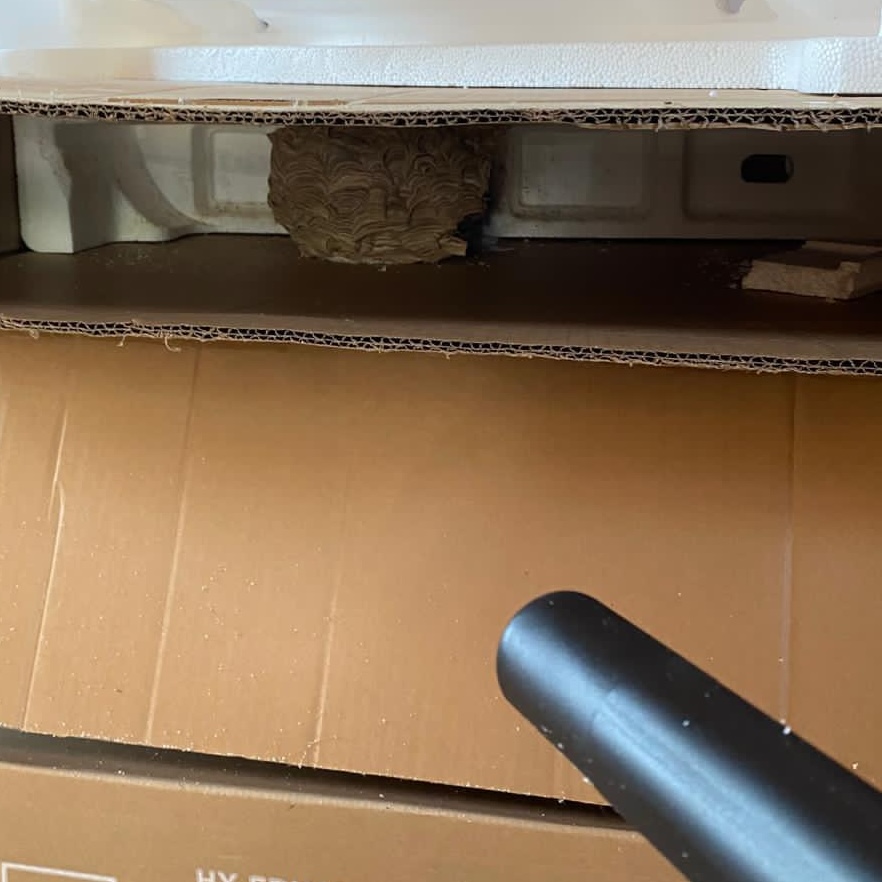How To Get Rid Of Wasps
Most of us don’t like wasps, especially when they’re buzzing around near our faces and food. They can ruin summer picnics and outdoor experiences, as it can be stressful trying to avoid stings.
The real danger is when wasps move onto your property. When they build nests in your garden, home or business premises, wasps can become a health risk as well as a significant source of irritation.
At Mission Pest Control, we have extensive experience carrying out wasp nest removal throughout Swindon and the surrounding area. We specialise in chemical free heat treatments to remove wasps safely and effectively.
To help residents understand the dangers of wasps, how to identify a wasp nest and how to get rid of wasps quickly, we’ve put together this handy guide.
Dangers Of Wasps Building Nests On Your Property
In summer, it’s not uncommon to see a few wasps flying around your garden, or even inside your home. Individual wasps are not an issue, as they will only sting if frightened, so as long as you leave them alone, they’ll be fine.
The issue comes when wasps build nests on your property. Having a colony of worker wasps constantly buzzing around your property searching for food sources to take back to the nest can cause disruption and increase your risk of being stung.
It can be impossible to remain a safe distance from a wasp nest if they build it inside your home. As such, you could be stung, which could cause itchiness, skin irritation, infection or, in some cases, an allergic reaction.
While wasps don’t swarm like honey bees, lots of them flying around your space can be distressing and annoying, especially if you keen to avoid being stung. Wasps nests can sometimes cause structural issues to your property as well, as the wasps build them by ripping bits of wood, which could be taken from furniture, beams or other parts of your home’s structure.
Wasps don’t reuse the same nest, so in autumn the nest will be abandoned. In the early spring, the new queen wasps will be build a new nest. While the old nest won’t be used to house the wasps, it could become a haven for other pests, such as moths or ants.

Signs Of A Wasp Nest
Wasps nests are distinctive structures, but you might not know what they look like, or where to find them. Signs of a wasp nest include:
- Seeing The Nest: The most obvious sign of a wasp nest is seeing it. Wasp nests are made from chewed wood fibres, which looks like papier-mâché. The outside of a wasp nest is usually grey in colour and there is a swirl-like pattern to it, with a small hole for the wasps to enter and exit through.
- Buzzing Sounds And Increased Wasp Activity: Because wasps often build their nests in tight places, like chimneys, wall cavities, and eaves, you might not see the nest itself. Instead, look out for buzzing sounds inside your walls and lots of wasps flying to and from the same area.
- Damaged Wood: As mentioned, wasps build their nests from chewed wood, so if you notice fences, beams or other wooden structures on your property have small chew marks and piles of discarded wood pulp around them, then this could be an indication that wasps are building their nest nearby.
In some cases, you might think you have wasps, but the issue is actually a bee nest. Bee nests are made of wax, and the hexagonal pattern is clearly visible on the outside. Since bees are important pollinators and many species are endangered, Mission Pest Control does not eradicate bees, but we do work with local beekeepers to help relocate bees.
Hornets are another species often mistaken for wasps, and they are actually a type of wasp, so this is understandable. What sets hornets apart is that they and their nests are larger, and hornet nests are usually found hanging in exposed locations such as one tree branches.
Wasps, on the other hand, prefer enclosed locations for their nests, such as inside homes, lofts, rafters, wall cavities and other tight spaces. Some wasp species even build nests underground.
What To Do If You Notice A Wasp Nest
If you notice a wasp nest on your property, it’s crucial that you don’t approach or touch it. While there are DIY wasp removal products, these are often ineffective, and will only make the wasps aggressive.
The sole purpose of worker wasps is to protect the queen and help her expand the colony, so if they feel threatened, they will sting.
These painful stings can be irritating and dangerous if you have a wasp allergy. Also, if you don’t remove the nest the first time, then the nest might expand and when the wasp season is over, they may abandon it and more new queen wasps might start new nests.
So, next season, you could be faced with an even bigger wasp problem than previously if you don’t fully eradicate the nest and wasp colony.
Thankfully, Mission Pest Control offers expert heat treatments for wasps that are chemical free and can quickly remove the wasps.
If there is a wasp nest inside a tight space, such as a chimney, wall cavity or garden shed, the heat can permeate and successfully eradicate the wasps.
Our team can then safely remove the wasps without causing structural damage to your property, so your space is safe from these irritating insects. If necessary, we can also use effective wasp traps to help remove large colonies fast.
By calling Mission Pest Control as soon as possible, you can remove the wasp infestation from your Swindon property quickly and safely. To learn more about our chemical free wasp treatments, check out our guide: What Is Heat Treatment For Pest Control?

Is It Possible To Prevent Wasps?
It can be difficult to prevent wasps entering your garden, as it’s outside. Once they’re close to your property, they can make their way indoors through open windows or doors.
Some simple preventative measures that can help reduce your chances of a wasp infestation include:
- Install Fly Screens: It can be difficult to keep all your doors and windows closed all the time, especially in the summer when the weather is warm. If you like to have your windows open, consider fitting fly screens, which can stop wasps and other flying insects from making their way inside.
- Clear Away Potential Food Sources: Like most pests, wasps will build their nests close to food. Wasps are attracted to sugary substances, so if you have fruit trees, clear away any rotten fruit as soon as possible, and keep bins tightly closed. If you use your garden during warmer weather, make sure you clear away sugary drinks and empty plates quickly before wasps can start eating.
- Keep Your Garden And Home Clean And Clear Of Debris: Although they like sugary substances, wasps will eat almost anything, such as vegetation and dead insects, including other wasps. So, make sure when you prune plants or trees, you remove the branches quickly, and keep your garden clean. Also, by regularly cleaning areas like sheds, attics and other tight spaces, you can be vigilant and quickly notice signs of a wasp nest.
How To Get Rid Of Wasps: Conclusion
Ultimately, it’s difficult to prevent or deter wasps from entering your garden or outdoor space. Once in, they can find comfortable, sheltered areas where they can build their nests.
That’s why it’s important that you call in professional pest control providers as soon as you see signs of a wasp nest.
At Mission Pest Control, we offer wasp nest removal and chemical free wasp treatments, using our cutting-edge heat treatment solutions.
Our team can quickly attend your property and carry out a safe and effective removal of all wasps and their nests.
To book an effective, chemical free wasp nest treatment, contact us on 01793 379333 or by emailing hello@missionpestcontrol.co.uk.
